News
Cornell is about to deport a student over Palestine activism

The student encampment movement last school year turned institutions of higher education into flashpoints of struggle over Israel’s ethnic cleansing of Palestinians, US support for it, and the right to speak out against it. This year, college and university campuses have become laboratories of repression where different administrative efforts to silence Palestine solidarity and antiwar demonstrators are being deployed. And that is playing out right now at Cornell University.
As Aaron Fernando writes at The Nation, “Cornell University, in Ithaca, New York, has taken disciplinary action against an international student that will likely force him to leave the country, and could have a chilling effect on other international students participating in political protests.
Momodou Taal is a PhD candidate in Africana studies and a graduate student worker, attending Cornell under the F-1 visa program. In the last academic year, Taal joined student-led actions demanding that Cornell divest from industries complicit in Israel’s attacks on civilians in Gaza.”
The Cornell grad worker union, Cornell Graduate Students United-UE, released a statement condemning the university’s disciplinary actions against Taal, and is demanding the administration bargain with the union “over the effects of the discipline administered to Taal.” “CGSU-UE condemns Taal’s suspension, which represents a disturbing pattern of discriminatory discipline against marginalized graduate workers. The union is still fighting for just cause protections in discipline and discharge, due process for academic evaluations, strong academic freedom, and nondiscrimination protections inclusive of political affiliation and action, religious practice, and caste.” In this urgent episode, Max speaks about Cornell’s actions against Taal with two members of the CGSU-UE bargaining committee: Jenna Marvin, a third-year PhD student in the History of Art & Visual Studies at Cornell; and Jawuanna McAllister, a sixth-year PhD candidate in Molecular Biology and Genetics at Cornell.
Additional links/info below:
Permanent links below:
Featured Music:
Jules Taylor, “Working People” Theme Song
Studio Production: Max Alvarez
Post-Production: Jules Taylor
Transcript
The following is a rushed transcript and may contain errors. A proofread version will be made available as soon as possible.
Jawuanna McAllister:
Hi, my name’s Jawuanna. I’m a sixth year PhD candidate in molecular biology and genetics at Cornell. So I do a lot of stuff with cancer cells and I’m also a member of the C-G-S-U-U-E bargaining committee.
Jenna Marvin:
Hi, my name is Jenna Marvin. I am a third year PhD student in the department of the History of Art at Cornell University. I actually work on the history of American photography and like Joanna, I’m also a member of CGS U E’s bargaining committee.
Maximillian Alvarez:
All right, welcome everyone to another episode of Working People, a podcast about the lives, jobs, dreams, and struggles of the working class today. Brought to you in partnership within in these Times magazine and the Real News Network produced by Jules Taylor and made possible by the support of listeners like You Working People is a proud member of the Labor Radio Podcast network. If you’re hungry for more worker and labor focus shows like ours, follow the link in the show notes and go check out the other great shows in our network and please support the work that we’re doing here at Working People because we can’t keep going without you. Share our episodes with your coworkers, your friends and family members. Leave positive reviews of the show on Spotify and Apple Podcasts and reach out to us if you have recommendations for folks you’d like us to talk to or subjects you’d like us to investigate and please support the work that we do at The Real News by going to the real news.com/donate, especially if you want to see more reporting from the front lines of struggle around the US and across the world.
My name is Maximillian Alvarez and we’ve got an urgent episode for y’all today. We are recording this on Tuesday, October 1st, and so I just want to say up top that circumstances may change by the time you hear this, but we are going to do our best to turn this episode around and get it published as soon as we can after we finish this recording. But today on Tuesday, October 1st, as we prepare to commemorate a year of Israel’s genocide of Palestinians in Gaza in the West Bank as Israel with the United States is full backing, drags the Middle East into an all-out war. The war here at home is ramping up on working people and people of conscience everywhere who are speaking out and taking action to try to stop the slaughter, or at least to pressure those in power to do so. Just as the student encampment movement last school year turned institutions of higher education into a flashpoint of struggle over Israel’s ethnic cleansing of Palestinians, US support for it and the right to speak out against it, college and university campuses this year are at the bleeding edge of institutional efforts to silence and repress Gaza solidarity and anti-war demonstrators.
And that is playing out right now as we speak at Cornell University. As Aaron Fernando writes at the nation, and I’m going to quote this piece at length, quote, Cornell University in Ithaca, New York has taken disciplinary action against an international student that will likely force him to leave the country and could have a chilling effect on other international students participating in political protests. Mama Dal is a PhD candidate in Africana studies and a graduate student worker attending Cornell under the F1 Visa program. In the last academic year, Taal joins student-led actions demanding that Cornell divest from industries complicit in Israel’s attacks on civilians in Gaza. Cornell student activists were not alone in launching public demonstrations across their college encampments took hold across the country. In response, some universities called in police to clear, often forcefully pro-Palestinian student protestors. But Cornell took a different approach during a year when it ostensibly prioritized free expression.
The university created a new policy to crack down on these types of protest first issued on January 24th, 2024. The interim expressive activities, policy limits when amplified sound can be used, delineates which objects are prohibited at collective campus actions like candles and sticks and subjects, some protestors to increased disciplinary action. By the end of the spring semester, six Cornell students including TAL face suspension for their pro-Palestinian activities. I’m trying to fight this to at least have an investigation and due process said tal, I’m not asking for anything special. I’m asking for Cornell to follow their own procedure. The Cornell Graduate Student Union, which is attempting to help Tall said no investigation was conducted before the discipline of temporary suspension was issued to Mama de. The Union issued a press release on Tuesday explaining that it is demanding to bargain with Cornell over the effects of the suspension.
The union said last spring. Cornell University signed a memorandum of agreement or MOA with C-G-S-U-E or Cornell graduate students United ue that gives the union the right to bargain over the effects of discipline of graduate workers on their working conditions effective immediately pursuant to the M-O-A-C-G-U-E issued a demand to bargain with Cornell administration over the effects of the discipline administered to tall C-G-S-U-U-E condemns tall suspension, which represents a disturbing pattern of discriminatory discipline against marginalized graduate workers. The union is still fighting for just cause protections and discipline and discharge due process for academic evaluations, strong academic freedom and non-discrimination protections, inclusive of political affiliation and action, religious practice and caste. So that is a lot of the context that we wanted to sort of provide for you guys up top. And we will of course link to Aaron Fernando’s piece in the nation so you could read more about it.
And I wouldn’t have to burden our guests today with explaining the whole context here because as I said at the top time is of the essence. And we do want to focus the second half of this conversation on where things stand right now as we record at Cornell and what folks can do right now to help and get involved. And so Joanna and Jenna from the Cornell Graduate Students Union are here to join us and help us unpack this important story. And thank you both so much for taking time to do this. I really appreciate it and I promise that that’s the most that folks are going to hear me talk at the top of the episode up here. I really wanted to turn things over to both of y’all and ask if, yeah, first if you could sort of take us back to last year, right when the student Antifa movement was really spreading to campuses, not just across the US but around the world, it felt like this was a really big step in the protest movement, and now we are facing a lot of the more sinister institutional backlash beyond just the immediate police led backlash that we saw on campuses like Columbia and more.
So can you both talk to us a little bit about how we got from there to here, and then we’ll talk about where things currently stand with Talls case and what the union is doing to fight it?
Jawuanna McAllister:
Yeah. Well first thank you again for having us. We’re really happy to be able to have a platform to share some of what’s going on at Cornell. Wish it was under different circumstances, but I think I speak for myself and Jenna when I say we’re both grateful that you made time for us, especially with the situation is evolving as quickly as it has been. So what I can say about last year is it’s actually interesting that you bring up some of the more overt forms of discipline and policing that were taking place across campuses. It’s actually one way that I think Cornell was different. So we are at Cornell’s main campus, which is in central New York in Ithaca, it’s college town. It’s pretty small, it’s rural for the most part. So a lot of what was taking place across the country we didn’t really have here in terms of overpolicing, especially with the student encampment in the spring. There were some flareups, but it never really got to the point where it was violent. Everything was entirely peaceful, at least from the side of the prop protestors.
But what was always present and I think now is sort of bubbling over and coming to the surface is some of these more insidious forms of repression and discipline and targeting of specific individuals who are perceived as leaders in this type of movement. And the censorship that we’re really seeing. It was taking place last semester, but now we’re just, it’s a continuation of what we had last semester. And I think one of the other shifts with Cornell is that we had a change in leadership. So our former provost is now the president of the university, our former president retired, take from that what you will. But so yeah, now we have a new president, Koff who has taken the helm and is really spearheading a lot of these more repressive tactics that he was able to get away with without as much attention I think in the past.
Jenna Marvin:
Yeah, I’ll jump in. And second Joanna, and of course, thank you for having us. We’re delighted to be here even under the difficult circumstances, but I really do want to highlight that change in leadership at Cornell. There was, I think a sense from all of us, either union members or activists that caught lakoff’s change of role from the provost to the president was going to lead to a real change intact or maybe even an intensification of what had been happening in the spring. And I think that our fears are being validated right now given what’s happening on campus. So that change of leadership I think is really key. You have a new president who will be an interim president, but is new nonetheless, who is trying to prove himself to higher up board of trustees, et cetera.
Maximillian Alvarez:
So let’s talk about, I guess how things have been moving in the new school year because it feels like I, and this is something that we’ve talked to students, graduate students and faculty who were involved with the different encampments last year with the coverage that we were doing here at the Real News. We spoke with folks at UCLA, university of Michigan, Columbia, Indiana, so on and so forth. And we were seeing that there were different kind of approaches that different administrations were taking. One university had snipers on the roof, the other university trying to make itself seem a little more like open students at Stanford won critical gains and concessions from the university. So this is definitely an intense and protracted struggle that has not had one single outcome. But what we have seen, especially heading into the new year, is that university administrations and the powers to which they answer be they on the donor side or the political side, have taken that time over the summer to really revamp their strategies for how to deal with, and when I say deal with that term’s carrying a lot of weight here, deal with these protests.
Some universities we’ve already seen are taking action, even disciplining or firing faculty. And now we have the case here at Cornell. So I wanted to ask if you could just sort of please tell us how things have gone this year. Did it feel markedly different walking onto campus at the beginning of this school year? And what has been the course of events that have led us to where we are right now and where do things currently stand right now?
Jawuanna McAllister:
Yeah, I think there was a sense from everyone on campus who’s been paying attention to events on campus that this year was going to be a little bit different and a little bit more intense. I believe it was the very first day of classes, I think it was on August 26th, the provost and new interim provost and new interim President Koff sent out an email to the entire student body and I believe the entire Cornell community outlining new guidelines for how discipline would be handled this semester for student activists. And it’s essentially this three tier system that’s more or less, as we’ve seen over the past week, just completely gone out the window where it is kind of like a three strike thing out. So first offense is, I guess I probably need to pull up the email, but the first offense is like a warning.
You get called into a conduct meeting with the student code of conduct office, and it’s a warning, the second offense, and it could just be an offense, could be, I don’t know, attending a protest, right? Attending a rally that’s going on a little too long per CUPD, Cornell University police’s discretion. Second defense is a non-academic suspension, which essentially bars people from participating in clubs and extracurriculars. And then the third would be more permanent or interim temporary suspension and academic suspension. So what’s happening to MOMU right now? The other change is that in response to some of the discipline that graduate workers in particular face in the spring where we had a number of international and just grads of various marginalized identities targeted for their participation in our encampment at Cornell were issued, they were suspended in response to that, graduate workers here organized a picket outside of a bargaining session, and that resulted in really demanding that the university bargain with us over that discipline.
And as a result of that, we got this memorandum of agreement, which we signed with the university in July. And this agreement essentially states that the university is obligated to bargain with us, bargain with our union over the effects of grad work or discipline. So you have this three tier system that the university is saying they’re going to abide by because there’s been a lot of questions about how disciplines made it out up until now because it’s been completely arbitrary. And our union has this MOA that we’ve signed with the university saying, you have to bargain with us. And as I think general can tell you more about things are not playing out how they should.
Jenna Marvin:
Yeah, I can talk a little bit more about the enforcement of the memorandum of agreement. It does feel like Cornell administration, like the head and the hand, are not talking on purpose. More than likely Cornell’s bargaining committee is composed of general counsel, faculty, and of course an outside negotiator as well. And so they are bargaining this memorandum of agreement with us beginning in May, which was a huge industry setting victory to win something that actually says your employer has to come to the bargaining table around really any kind of discipline that affects working conditions. So from the time we started bargaining that until July when we actually signed it, Cornell’s bargaining committee was working with C-G-S-U-U-E to hammer this out and it’s become final. And it’s a document that we are really proud of, not only for a victory for us, but for other graduate shops around the country.
So to see, I think we were all sort of waiting on bated breath to see how the university would handle the enforcement of the memorandum. And of course, the answer that we received is they are blatantly disregarding it. They have an obligation to bargain with us over any sort of discipline needed out that affects the terms and conditions of employment. And of course, in MoMA AL’S case, that is absolutely happening. Deen enrollment and the revoking of his visa alone constitutes a huge disruption to his terms and conditions of his work. So to have your bargaining committee actually bargain with the union to create this really, really clear, really, really, really clear guidelines for how discipline is to be handed down and how the union is to be involved in that process and then to completely disregard it, especially after sending out this three strikes email where due process is supposed to be a guarantee. It does feel like the president’s office is not communicating properly with the offices that actually are in charge of meeting out discipline. And it’s been very disappointing, to say the least from the union’s perspective.
Maximillian Alvarez:
Can I just ask a little more on that? I mean, I can’t imagine how they’re feeling right now, but what can you tell us about how Mama DE’s doing and how this is affecting them? For anyone out there listening who maybe is still asking those questions of like, well, why is this a labor issue? What are unions and grad workers have to do with Palestine? I guess what would you say to folks out there about why this is a labor issue and how this is affecting one of your members right now and their livelihood?
Jawuanna McAllister:
It’s very much a labor issue with the type of work that graduate workers do. We teach, we research, OU is a student in Africana studies, a grad worker in Africana studies. He can’t teach his classes right now because he’s been suspended. His students are missing out on all that he has to offer as an instructor because he can’t set foot on campus, he can’t do his job. So it’s very much a labor issue from a service level. And then you think about the types of things that graduate workers are being disciplined for, not only by participating in protest activity, but also just by teaching their subject matter in the classroom. I think Momu and a number of other graduate workers, just who I personally am aware of and have close friendships with, have reported some really troubling things about the response of the administration to the subject matter in their courses.
So this is really an issue of academic freedom as well, where you have people not only not having the freedom to express themselves really just on campus in general and oppose what’s happening in Palestine and the atrocities that they’re seeing, they can’t even teach about it as it relates to their courses, as it relates to their subject matter. That’s really scary at an institution that prides itself on Cornell. Being in an Ivy League institution, people pay a lot of money to come here, are really proud when they get in with an institution like Cornell with this type of reputation and really any institution, any, it just runs completely contrary to any institution of higher educations like educational and academic mission to be doing this. So it’s an issue of academic freedom, it’s an issue of worker autonomy and workers’ rights. And because we are workers, it’s very much a labor issue. Yeah,
Jenna Marvin:
Yeah. I’ve thought about this a lot in the last couple of days, and I don’t think there are many union members across industries in this country who would ever stand for the level of unilateral discipline from their employer that Cornell is meeting out to al right now. It is a fundamental union issue that your boss cannot exercise unilateral power over you. You get a say in your working conditions being hired and fired as part of your working condition. So this is an absolutely fundamental fight that unions, labor unions have been fighting for over 150 years in the United States. It’s absolutely crucial to our fight. And a union needs to be able to protect its workers from that complete unilateral bring down of power. And absolutely it is an academic freedom issue as well. To echo Joanna there, I work in the humanities. This is speaking of fundamental, it’s fundamental to what we do in the humanities is to teach about the horrors of history, to be frank, and to talk about what happens in the world today.
And that includes politics in all of its forms and it includes genocide. And to have students in the humanities anywhere across the university, but particularly right now in the humanities, I thinking maybe I shouldn’t teach this. I’m not really sure how that will be received by my students or I’m not sure who will find out about this. I hear that from my coworkers and that’s very scary. So what is happening to mom Al is absolutely a disgrace, but there are also many effects that trickle down from this. It’s about creating a culture of fear and when you workers are fearful, that is a union issue always.
Jawuanna McAllister:
There’s maybe one other thing that I just wanted to add to this that we haven’t, we’ve sort of talked around but haven’t actually spoken to directly, is a lot of people don’t understand what a grad worker union is because we are grad students and we also do work that makes the university run. So as Jenna has already highlighted, I think really eloquently, we teach, we do research on behalf of the university, but we’re also here taking classes. So we have these dual roles, and when the university disciplines workers under a as quote students or under the guise of academics, that is inextricable from our employment and our role as workers. So in mom’s case for example, when you are suspended as a student, you were also suspended and effectively fired from your employment. When you’re de enrolled as a student, you’re terminated. And to Jenna’s point earlier, there’s no other industry where that would be acceptable, where lack of due process or lack of just cause for termination because of something that is independent in the university’s eyes at least of your employment, is acceptable. And that’s also not a distinction that we really exist in practice. We’re one and the same. So I think that’s just maybe an important point to clarify for students. And we’re also workers and those things are inextricably linked.
Maximillian Alvarez:
Oh yeah. I mean, speaking as a former grad worker and member of University of Michigan, GEO, shout out to GEO. Yeah, we’re getting a lot of the education and practice in our coursework that we are then able to apply in our teaching work and be better educators. And lo and behold, we’re one and the same person learning and teaching at the same time. Holy shit. People can do more than one thing at once. And that I wanted to just kind of ask a quick question there because on the question of grad unions and grad labor struggles, I mean there is something sinister and kind of harrowingly that echoes one of the weapons of first resort that we tend to see during grad unionization efforts or grad strikes at universities is something that I’ve seen reporting on grad strikes and union efforts like across the country.
And I remember seeing myself as a tactic that the University of Michigan employed when I was a member of our graduate union there, international students have a sort of special place in the university’s calculus for how to instill fear and impose discipline and impose division within a bargaining unit. And I just wanted to ask if y’all could speak as union members about the fact that Amadou being an international student here is also a really important detail of the story, both in terms of what this discipline is going to mean for him personally, but also what him being an international student is allowing the university to do in perpetuating the chilling effect that y’all were talking about here. This is something that comes up all the time when grad students go on strike because universities will almost always like clockwork when a strike happens, they will send out an email notifying international students that if they’re not working, they could lose their visas and thus their immigration status. So could you please just speak to that for a second and then we’ll wrap up by asking what folks can do now to help?
Jawuanna McAllister:
Yeah, it’s not a surprise to anyone that when the boss wants to intimidate and instill fear, they go after the most vulnerable workers first. And that is our international students who make up approximately 50% of our membership, 50% of our bargaining unit. It’s an intimidation tactic through and through. It is, yeah, I don’t really have much more to add to that other than we see it for exactly what it is. And I think what’s been really heartening is to see the outrage from our international workers as well as the broader Cornell community. I think the response from the community is really demonstrating, and by community I mean on campus and then also more broadly nationwide, demonstrating to our workers here that people are not just going to sit by and accept this. Our union will not just sit by and let one of our own be disciplined and effectively have this visa status revoked and then effectively be deported. We’re not just going to sit by and allow that to happen. And I think that’s an important thing for that 50% of our unit to really see that we stand behind them 100%.
Jenna Marvin:
Yeah. I will add that one of the things that makes this situation around intimidation of international students at Cornell International workers incredibly divisive is that one of Cornell’s founding principles is any person, any study all over this campus. I see posters of it when I walked on the hall on my workspace. And so to sort of rest on the prestige of having 50% of our bargaining unit members be international workers who are some of the best, the brightest and the most generous colleagues ever, but then turn that right around and make people feel scared and to make people more vulnerable and for Cornell’s administration to feel like they have leverage or kind of control over international workers is really, really disappointing, particularly given its sort of founding ethos.
And just to echo, Joanna, if we have 50% of our bargaining unit members here on Visas, you better be sure that we we’re going to fight for one of our members being disciplined and possibly fired and losing his visa. If we don’t fight for that, what are we for? Right? This has always been integral to our organizing. It has always been integral to the contract that we are currently negotiating with Cornell. So it’s perhaps even as far as the numbers, even more of an issue here at Cornell than it’s if maybe comparable institutions in the United States.
Maximillian Alvarez:
Well, Joanna, Jenna, I want to thank you both again so much for taking time to chat with me. I really appreciate it and I just wanted to give y all the final word here and ask if you could let our listeners know what happens now and what the union is trying to do, what the campus community is doing to stand against this, and what folks out there who are listening to this, what they can do to stay up to date on this and what they can do to get involved themselves.
Jawuanna McAllister:
Yeah, I can go ahead and plug a few things. So as you mentioned before we started recording, we have a rally for workplace justice tomorrow Wednesday, what is tomorrow, October 2nd at noon, we will be marching from one of the buildings near central campus down to the administrative building, demanding that the university bargain with us over the effects of Madu tile suspension, and also demanding that the university give us just cause and due process when it comes to these various forms of discipline, along with protections for academic freedom and non-discrimination when it comes to political speech and activity, caste, international workers rights. These are all things that are really, really integral to our union. So that’s tomorrow, and we’ll have members of the community there, faculty, some folks from our A UP chapter will be joining us, which is exciting. So it’s really, it’s going to be a great event if anyone is in the, well, I don’t think you’ll have this released by the time this goes out, so you can cut that part. I’m just going to say if anyone’s here, they can feel free to come up to campus, but I doubt anyone will be here. And then Jenna, do you want to take some of the other things that we have going on right now?
Jenna Marvin:
Sure. I mean, for those people who are not in Ithaca and want to stay up to date, we are keeping people up to date with our Instagram. That’s at Cornell gsu. We’re trying to be as on top of the developing situation as we can. So that’s one avenue to stay informed. We have a bargaining session. CGSU will sit across the table from Cornell’s bargaining committee on Wednesday, October the ninth. And so look out for news around that there may be some coordinated action as the situation develops. We’re still thinking about that, but more news to come as the bargaining committee that Joanna and I are part of, sort of goes to sit at the table again with Cornell’s representatives given what has unfolded since our last session about two weeks ago. So more news to come stay informed. Instagram’s a great way to do it. And if you happen to be around for a rally tomorrow, come on out, have a chant, it’ll be cathartic.
Jawuanna McAllister:
I have two more things to plug. We should have made a list ahead of this. So we have an action network petition that UE National has just helped us launch earlier today. So if you are a member of a local, any local doesn’t have to be ue, please, please, please check out our social media and the UE national socials and you should be able to find that petition. We can also send you the link max and you can share that. And then we also have different petitions for different groups depending on what your affiliation is. So we have one that’s specific to grad locals. So please reach out to us. You can either DM us on Instagram or Twitter, or you can follow up with us at bc@cornellgradunion.org with any questions. Or we should just have questions about how to support or want to get access to any of those resources. We can send them to you directly through that email as well. Cornell GSU on socials?
Jenna Marvin:
I think so. That’s the Instagram.
Jawuanna McAllister:
We need Cornell to bargain with us. We have this MOA, it’s time for Cornell to hold up their end of that signed agreement and bargain with us over, not just mom do suspension, but any grad worker discipline under these policies. Me to set the table.
Related
News
International Longshoremen’s Association suspend strike as negotiations continue
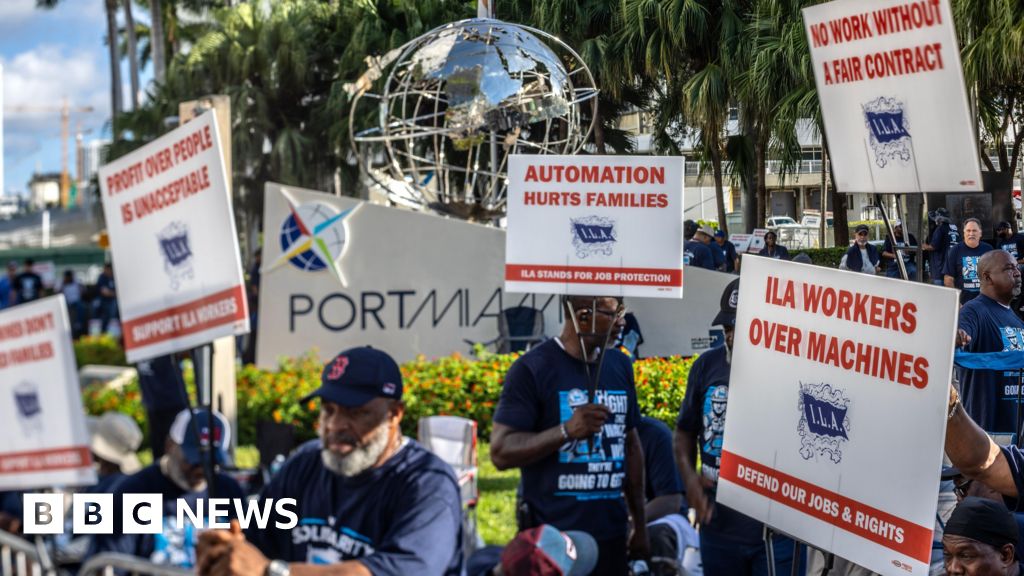
The union representing tens of thousands of dockworkers across the US has agreed to suspend its strike while negotiations continue.
Members of the International Longshoremen’s Association (ILA) walked out on Tuesday at 14 major ports along the east and Gulf coats, halting container traffic from Maine to Texas.
The union says it has reached a tentative agreement on wages and will go back to work on Friday as talks continue until 15 January.
The action marked the first such shutdown in almost 50 years and threatened to wreak chaos amid the busy holiday shopping season and forthcoming presidential election.
Business
Rachel Reeves’ £22bn carbon capture spend highlights investment focus

The government will prioritise and increase investment in major projects at this month’s Budget, Chancellor Rachel Reeves has said.
In addition, she announced a nearly £22bn investment in two major new carbon capture schemes over 25 years.
She criticised plans she inherited from the previous government to cut investment as a share of the economy, saying she would not repeat “those mistakes”.
But the Conservatives said it was thanks to them that funding had already been announced for the carbon capture projects.
After weeks of hints about the chancellor changing her self-imposed borrowing rules to allow significantly more investment in major projects, Ms Reeves has given her strongest indication yet of a significant increase to levels of state investment.
The green schemes are two new carbon capture and storage projects on Merseyside and Teesside.
The government said they will create and support thousands of jobs, draw in private investment and help the UK meet its climate goals.
Funding of up to £21.7bn over 25 years will subsidise three projects once they start capturing carbon from hydrogen, gas, and energy from waste.
Oil and gas giants BP and Equinor will be among the firms providing private sector funding for the projects, she said, adding that other countries “would love to get this sort of investment”.
But Greenpeace UK’s policy director Doug Parr said more than £21bn “is a lot of money to spend on something that is going to extend the life of planet-heating oil and gas production”.
The chancellor said contracts such as this were never signed by the previous government because it did not prioritise capital investment – which is money spent on items such as buildings, equipment, and IT.
She directly criticised the fact that the UK’s capital budget is due to fall from 2.5% of the size of the economy to 1.6%.
However, Conservative shadow energy secretary Claire Coutinho said “it’s thanks to the Conservatives that funding was already announced for these projects in the spring of 2023”.
She added that the announcement “will not make up for the mass deindustrialisation pathway that Ed Miliband’s costly net zero and energy policies are leading us to, with the devastating impact of his zealotry on jobs already seen in steel-making, refineries and in the North Sea”.
But Ms Reeves said the previous government “were cutting back on investment at exactly the time we needed to be increasing investment in our economy”.
“I’m not going to make those mistakes,” she said.
Her words are the clearest confirmation of a shift in approach to spending on major projects at the Budget and Spending Review, connected with attempts to attract significant private investment at the upcoming International Investment Summit.
That summit will be a “massive opportunity for us to show what Britain has to offer to some of the biggest investors”, she said, including private equity, venture capitalists, and sovereign wealth funds.
She also denied suggestions that the government’s budget rhetoric had spread gloom among consumers and businesses, saying there would be a “drum beat” of major investments in the coming days.
Money
McDonald’s reveals iconic menu item is returning to the UK in just DAYS after almost a decade

MCDONALD’S has confirmed it is bringing back an iconic burger that hasn’t been seen in the UK for almost a decade – and fans will be delighted.
Social media has been awash with rumours over the past few weeks that the much-loved McRib was making a shock comeback.
And now, the fast food chain has revealed the legendary burger will indeed be back on sale in just days for the first time since early 2015.
The menu item will be available across UK restaurants from October 16, just over a week away, for a limited time only.
The burger, which combines a pork patty with tangy barbecue sauce, pickles and onions, will be on sale for £4.49 as an individual item or £6.19 as part of a medium extra value meal.
The burger itself contains 509 calories.
Customers have long begged for the McRib, which first launched in the UK in 1981, to return to menus after it was abruptly removed almost a decade ago.
Thomas O’Neill, head of menu at McDonald’s UK, said: “We have heard our fans loud and clear – the fan petitions and pleas on social – and after almost a decade of anticipation, we are thrilled to bring back this iconic menu item.
“Knowing how well-loved the McRib is, we had very little choice – we had to make it happen.”
It comes after a mystery message appeared on dozens of McDonald’s customers MyMcDonald’s apps with a glitch that appeared to signify the McRib was returning.
Fast food fans took to X and Facebook two weeks ago sharing images that showed “page not found” and “McRib Test Notification” error messages that had cropped up on their phones.
Posting on X, one said: ” “Ummm excuse me McDonald’s, we all saw it. THE MCRIB IS COMING BACK!”
Another commented: “McDonald’s thought they could sneak this one by and I wouldn’t notice. McRib coming to the UK.”
Another said “McDonald’s just let everyone in the UK know the McRib is coming back with a broken text notification”, to which a fellow fan replied: “This isn’t an accident, it’s a marketing ploy. Rather clever!”
OTHER MCDONALD’S MENU CHANGES
McDonald’s regularly shakes up its menu or introduces games to keep customers on their toes.
The fast food chain recently announced it is adding mini hashbrowns to menus for the first time.
Customers will be able to get the twist on a classic menu item across more than 1,300 UK restaurants from October 16 – the same date the McRib is being relaunched.
Foodies can pick up a five-pack for £1.49 while a 15-piece sharebox will cost £2.99.
Remember though that prices do vary from restaurant to restaurant so you could pay more or less than these prices.
It is not yet clear whether the hashbrowns will become a permanent menu item, so if you want to give them a go, make sure you’re quick.
Six menu items will also be removed later this month when the McDonald’s Monopoly game comes to a close.
These are the six items that customers will have to wave goodbye to:
- Philly Cheese Stack
- Chicken Big Mac
- Mozzarella Dippers
- Galaxy Chocolate McFlurry
- Twix Caramel McFlurry
- Twix Latte
If you are curious about how the game works and what prizes you can win, read our article here.
It is worth bearing in mind that McDonald’s regularly updates its menu, so it is always worth reading updates online to avoid missing out.
The chain regularly posts on social media informing customers of any upcoming changes.
How to save at McDonald’s
You could end up being charged more for a McDonald’s meal based solely on the McDonald’s restaurant you choose.
Research by The Sun found a Big Mac meal can be up to 30% cheaper at restaurants just two miles apart from each other.
You can pick up a Big Mac and fries for just £2.99 at any time by filling in a feedback survey found on McDonald’s receipts.
The receipt should come with a 12-digit code which you can enter into the Food for Thought website alongside your submitted survey.
You’ll then receive a five-digit code which is your voucher for the £2.99 offer.
There are some deals and offers you can only get if you have the My McDonald’s app, so it’s worth signing up to get money off your meals.
The MyMcDonald’s app can be downloaded on iPhone and Android phones and is quick to set up.
You can also bag freebies and discounts on your birthday if you’re a My McDonald’s app user.
The chain has recently sent out reminders to app users to fill out their birthday details – otherwise they could miss out on birthday treats.
Do you have a money problem that needs sorting? Get in touch by emailing money-sm@news.co.uk.
Plus, you can join our Sun Money Chats and Tips Facebook group to share your tips and stories
News
UK commitment to Falklands ‘unwavering’ despite Chagos deal, says governor
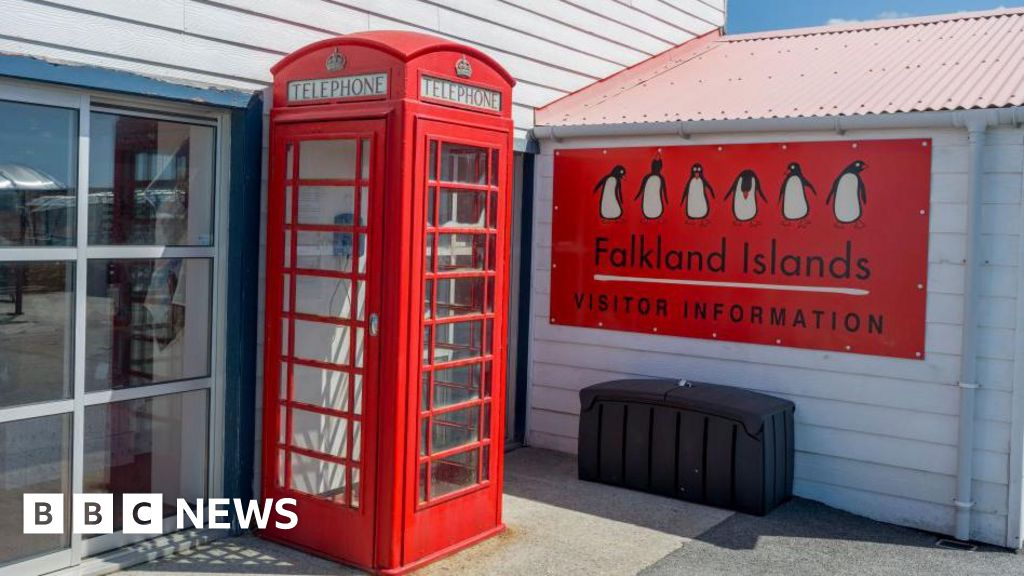
The governor of the Falkland Islands has sought to calm concerns over the territory’s sovereignty, following the UK’s deal to hand over the Chagos Islands.
In a historic move, the UK has agreed to give up ownership of the tropical archipelago to Mauritius, after decades of often fractious negotiations.
But in an attempt to assuage the fears of people on another strategically-important group of islands, Falklands Governor Alison Blake said the legal and historical context of the two territories are “very different”.
The UK commitment to the South Atlantic territory’s sovereignty is “unwavering” and “remains undiminished”, she said in a statement posted to social media.
In the message to residents, she said: “I would like to reassure you that the legal and historical contexts of the Chagos Archipelago and the Falkland Islands are very different.
“UK ministers have been very clear throughout the process that the UK will not agree to anything that runs the risk of jeopardising sovereignty in other Overseas Territories.
“The UK government remains committed to defending the Falkland Islanders’ right of self-determination, and the UK’s unwavering commitment to defend UK sovereignty remains undiminished.”
The Falkland Islands are a British overseas territory in the south-west Atlantic Ocean. Argentina has long claimed sovereignty over the islands.
Argentina invaded in 1982 in a bid to reclaim sovereignty and said it had inherited the Falkland Islands from Spain in the 1800s.
A brief but bitter war lasting 74 days followed – with 655 Argentinian, 255 British and three Falkland deaths – before British forces regained control on 14 June 1982.
Gov Blake’s announcement came after a deal which, after years of negotiations, saw the UK hand over the Chagos Islands to Mauritius.
This includes the tropical atoll of Diego Garcia, used by the US government as a highly-secretive military base for its warships and long-range bombers.
The treaty will also “address wrongs of the past and demonstrate the commitment of both parties to support the welfare of Chagossians”, according to a joint statement from UK Prime Minister Keir Starmer and Mauritius Prime Minister Pravind Jugnauth.
Money
Exact date discount clothing chain with nearly 200 UK stores to close town centre shop despite 160 objections
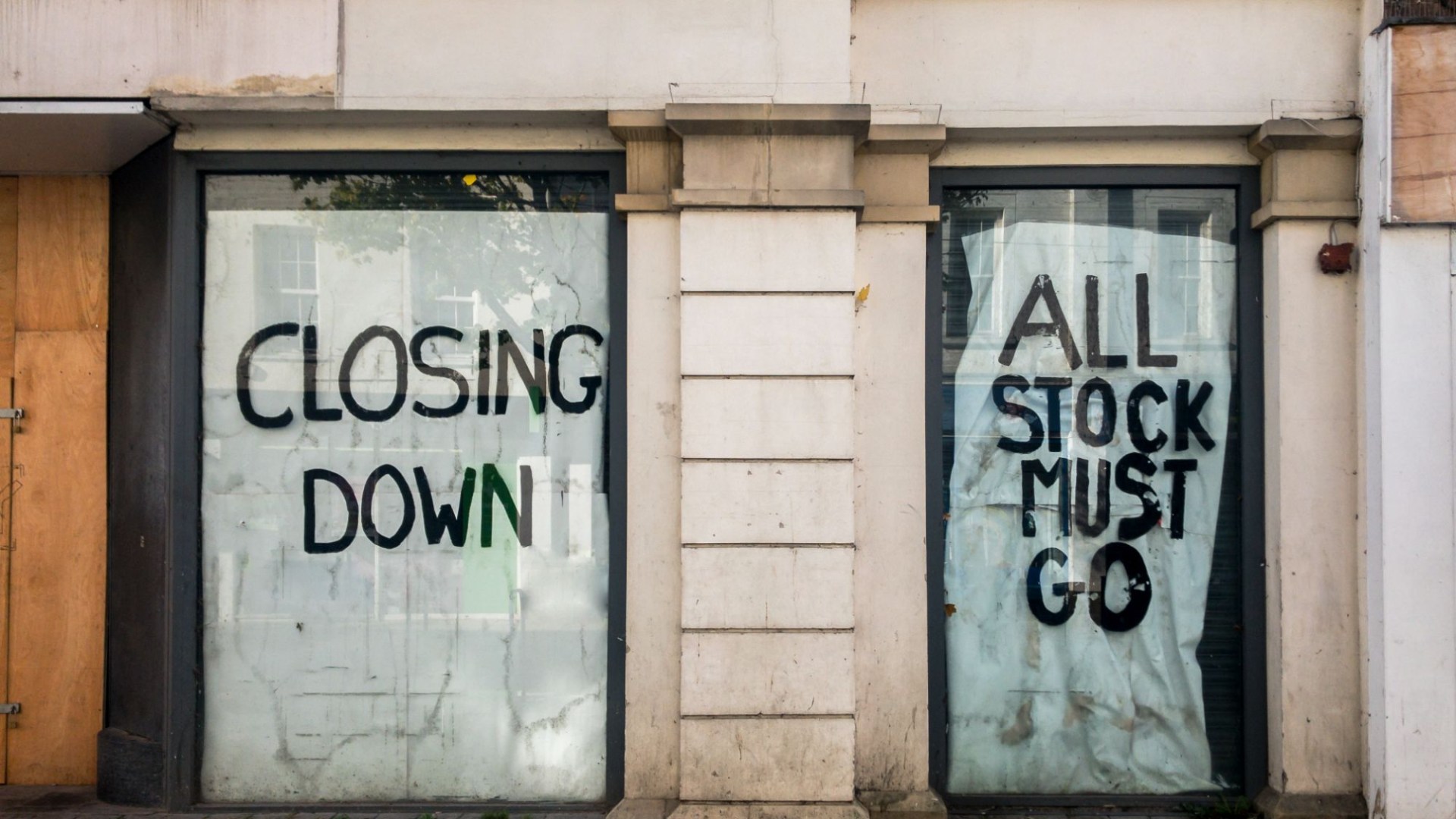
A DISCOUNT clothing chain store is set to close down despite 160 objections.
An Original Factory Shop in Ben Rhydding will close down on October 19, to make way for a controversial new development.
A drive thru coffee shop will instead be built on the corner of the A65 and Wheatley lane, after it was approved in August.
The move has been criticised by locals, with more than with more than 160 people writing to Bradford Council urging the plans be refused, according to The Telegraph and Argus.
A further 61 people signing a petition against the application, which was submitted by The EG Group Ltd and Burley Developments Ltd.
It is currently not known which change will be moving on to the site, however EG Group, founded by the billionaire Issa brothers, operates other sites that include Starbucks, Greggs, and Krispy Kreme.
In a post on its Facebook page this week, the Original Factory Shop, Ilkley said: “We are sorry to let you know our store will close it’s doors on 19th October 2024.
They added: “We take this opportunity to thank all of the local community and our store colleagues for their support throughout our time here in Ilkley.”
Original Factory Shop has close to 200 stores located around the UK.
The sad news comes amid a wave of store closures across the UK.
Retailers are being squeezed by spiralling rents and mortgage rates as well as spikes in running costs.
That, combined with the rapid march towards online shopping as the dominant model in the sector, is leaving physical stores on the brink.
An outdoor clothing chain has also launched a huge closing down sale as Trespass closes its store in Coventry.
The activewear brand employs more than 1,500 people in the UK but has shut around half a dozen stores this year.
The date of the closure was not specified at the time, but local media reported that the shutters came down for the last time on September 13.
Retail woes
Other retailers, such as Homebase, Boots, and Clarks, have been reducing the number of their high-street branches.
Rising rents, energy bills, and the cost of living have also caused many retailers to fail.
Several big retailers have fallen into administration in the past year, including Wilko, Paperchase, and most recently, The Body Shop and Ted Baker.
The Body Shop collapsed into administration on February 13, putting its almost 198 branches at risk of closure.
Since then, it has closed down 82 locations.
Retailers closing stores in 2024
RETAILERS have been hit by soaring inflation and a downturn in spending due to the cost of living crisis.
High energy costs and a move to shopping online are also taking their toll.
Some high street shops have closed due to businesses opening up in different locations such as larger retail parks.
Shops may also close due to a number of other reasons, such as rising rents.
We explain which retailers are closing in 2024:
- Argos – The brand announced plans to close 100 standalone UK branches last year as it looks to move away from the high street and focus on expanding its presence in supermarkets.
- B&Q – The chain has over 300 shops across the UK, with two stores closing this year due to leases not being renewed. It has plans to open more in 2024 too.
- Boots – The health and beauty chain announced that it would be closing 300 stores last July. Closures are ongoing and this will see the retailer’s estate reduced from 2,200 to 1,900 shops.
- Clintons – Clintons mulled plans to close 38 shops in a bid to avoid insolvency late last year. We’ve listed the stores affected.
- Costa Coffee – The caffeine giant has around 2,000 sites nationwide, so chances are you’ll have one near you. The chain has shut the doors to dozens of its sites recently. We’ve revealed which stores are due to close this year.
- Iceland – The supermarket has more than 900 stores but closed nearly two dozen sites in 2023, and more selected shops are due to shut.
- Lidl – The supermarket, which has 950 stores, is changing up shop locations, which has meant that some stores have to close. But the retailer is also looking to open 12 new supermarkets.
- M&S – M&S, which runs 405 stores across the country, has been closing a string of branches across the country in a blow for shoppers. It’s not all bad news, though, because the chain also has big plans to open dozens of new shops.
- Trespass – The firm announced in July last year that it was closing six branches, but more are on the way.
- WHSmith – The retail giant, which runs over 1,100 stores, has shut eight stores since March 2023, but more are coming.
News
UK deal to hand over Chagos Islands criticised over lack of say for Chagossians
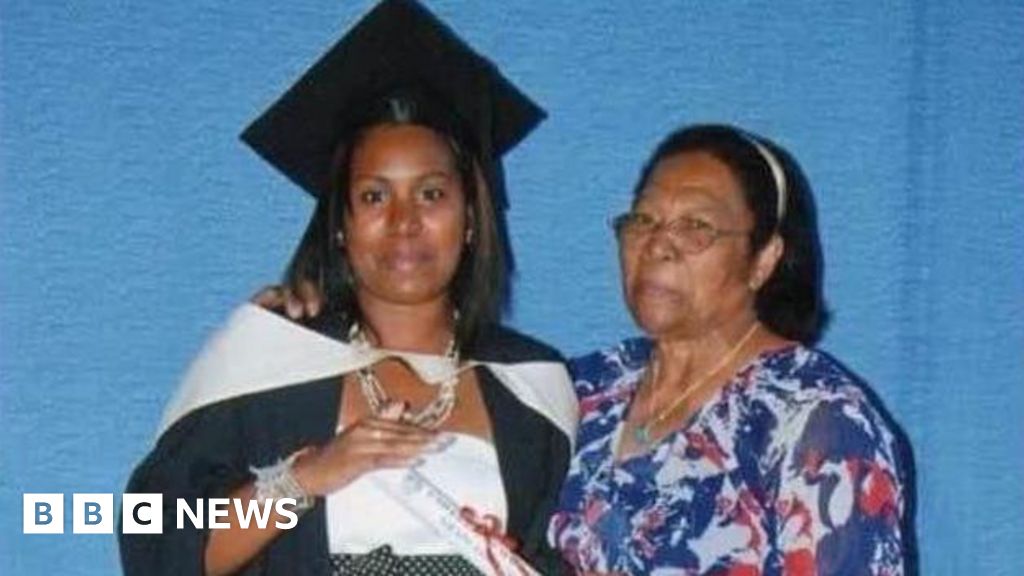
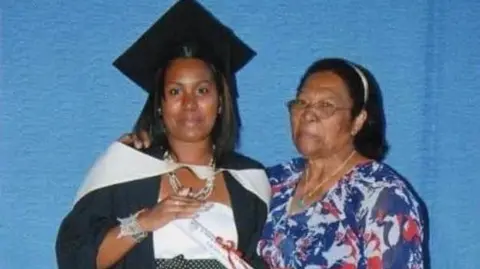 Pascalina Nellan
Pascalina NellanPeople with roots in the Chagos Islands have criticised what they called their “exclusion” from negotiations leading to the UK government’s deal to give up its sovereignty of the region.
The remote but strategically important cluster of islands in the Indian Ocean is set to be handed to Mauritius after more than half a century.
Some Chagossians the BBC spoke to broadly welcomed the deal, but many said indigenous people had been repeatedly refused an opportunity to take part in talks.
The Foreign Office said the interests of the Chagossian community had been “an important part of the negotiations”.
Pascalina Nellan, whose grandmother was born on a key island in the region – Diego Garcia, said the deal amounted to a “backstabbing” by the UK government.
Ms Nellan was born in Mauritius, where her grandmother resettled after being removed from Diego Garcia to make way for a US Air Force base.
Two years ago she moved to the UK, where she has been calling for Chagossian involvement in the deal over the territory.
“Every time we made a request to be heard we have been excluded,” she said, claiming UK officials said the Chagossian community could not be involved in negotiations between the two countries.
“Today, again, we’ve been excluded,” the 34-year-old postgraduate student told the BBC.
“We need to respect the rights of indigenous people.”
Ms Nellan said she would like to go back to the islands, but not under Mauritius’ control.
“Our right to self-determination – whether we want to be British citizens or Mauritian citizens at all – has been stripped today,” she said.
Frankie Bontemps, a second generation Chagossian in the UK, told the BBC that he felt “betrayed” and “angry” on Thursday because “Chagossians have never been involved” in the negotiations.
“We remain powerless and voiceless in determining our own future”, he said, and called for the full inclusion of Chagossians in drafting the treaty.
 Steeve Bancal
Steeve BancalSteeve Bancal, a trainee social worker from Sussex, was positive about the deal.
He said Mauritius was more likely to put resettlement plans in place for Chagossians than the UK, who had “done nothing” for the community.
He expressed hope to return to the islands with his mother, who was also removed from Diego Garcia. She resettled in Mauritius, where Mr Bancal was born.
Mr Bancal said it would be a “dream come true” for his mother, 74, to return to Diego Garcia.
However, he also criticised the negotiations, saying they happened “behind closed doors”.
“None of us were told what was happening. It’s unfair on us,” he said.
“It’s our heritage – we should have had one or two people in the room.
“I don’t think the UK government trusts us.”
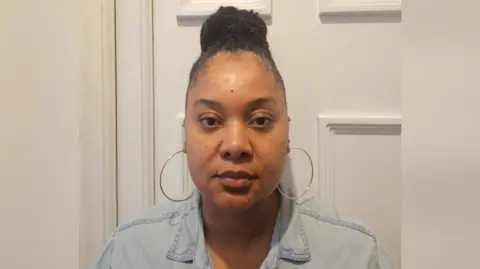 Isabelle Charlot
Isabelle CharlotIsabelle Charlot was born in Mauritius to Chagossian parents, and has lived in the UK – where she is the chairperson of the Chagos Islanders Movement – for 19 years.
She said she now hoped to return to the archipelago, from which Britain forcibly removed more than 1,000 islanders between 1965 and 1973 after gaining control of the territory.
“That is what my family and I have been waiting for,” Ms Charlot told the BBC.
She said she welcomed the deal as a step toward “reclaiming [her] identity, heritage and homeland”, all of which had been “robbed” from her.
“I [knew] that the Labour government would want to right the historical wrongs and respect the international law,” she said.
‘Genuinely historic’
Human Rights Watch (HRW) called for the Chagossians to be consulted on the deal.
Responding to the UK government’s announcement, Clive Baldwin, senior legal advisor at HRW, said: “It does not guarantee that the Chagossians will return to their homeland, appears to explicitly ban them from the largest island, Diego Garcia, for another century, and does not mention the reparations they are all owed to rebuild their future.”
Mr Baldwin called for meaningful consultations with the Chagossians.
He said unless this happens, the UK, US and now Mauritius would be be responsible for “a still ongoing colonial crime”.
 ALAMY
ALAMYJonathan Powell, the UK’s Special Envoy for British Indian Ocean Territory negotiations, said on Thursday that Britain’s past treatment of the Chagossians was “shameful”.
But he called the agreement, reached after 11 rounds of negotiations, “genuinely historic”.
He said he could not guarantee whether Chagossians would be able to return to the islands, since they were to become Mauritian territory, but that the UK was committed to “help with resettlements if that’s possible”.
The UK government said it will also provide a package of financial support to Mauritius, including annual payments and infrastructure investment.
An FCDO spokesperson said: “This is a bilateral agreement between the UK and Mauritius.”
“We are mindful that the future of the islands is an important issue for the Chagossian community. Their interests have been an important part of the negotiations.”
-

 Womens Workouts1 week ago
Womens Workouts1 week ago3 Day Full Body Women’s Dumbbell Only Workout
-

 Science & Environment2 weeks ago
Science & Environment2 weeks agoHow to unsnarl a tangle of threads, according to physics
-

 Technology2 weeks ago
Technology2 weeks agoWould-be reality TV contestants ‘not looking real’
-

 Science & Environment2 weeks ago
Science & Environment2 weeks ago‘Running of the bulls’ festival crowds move like charged particles
-

 Science & Environment2 weeks ago
Science & Environment2 weeks agoHyperelastic gel is one of the stretchiest materials known to science
-

 Science & Environment2 weeks ago
Science & Environment2 weeks agoMaxwell’s demon charges quantum batteries inside of a quantum computer
-

 News2 weeks ago
News2 weeks agoOur millionaire neighbour blocks us from using public footpath & screams at us in street.. it’s like living in a WARZONE – WordupNews
-

 Science & Environment2 weeks ago
Science & Environment2 weeks agoHow to wrap your mind around the real multiverse
-

 Science & Environment2 weeks ago
Science & Environment2 weeks agoSunlight-trapping device can generate temperatures over 1000°C
-

 Science & Environment2 weeks ago
Science & Environment2 weeks agoLiquid crystals could improve quantum communication devices
-

 Science & Environment2 weeks ago
Science & Environment2 weeks agoITER: Is the world’s biggest fusion experiment dead after new delay to 2035?
-

 Science & Environment2 weeks ago
Science & Environment2 weeks agoPhysicists are grappling with their own reproducibility crisis
-

 Science & Environment2 weeks ago
Science & Environment2 weeks agoQuantum ‘supersolid’ matter stirred using magnets
-

 News2 weeks ago
News2 weeks agoYou’re a Hypocrite, And So Am I
-

 Science & Environment2 weeks ago
Science & Environment2 weeks agoWhy this is a golden age for life to thrive across the universe
-

 Sport2 weeks ago
Sport2 weeks agoJoshua vs Dubois: Chris Eubank Jr says ‘AJ’ could beat Tyson Fury and any other heavyweight in the world
-

 Science & Environment2 weeks ago
Science & Environment2 weeks agoQuantum forces used to automatically assemble tiny device
-

 Science & Environment2 weeks ago
Science & Environment2 weeks agoCaroline Ellison aims to duck prison sentence for role in FTX collapse
-

 Science & Environment2 weeks ago
Science & Environment2 weeks agoNuclear fusion experiment overcomes two key operating hurdles
-

 Science & Environment2 weeks ago
Science & Environment2 weeks agoTime travel sci-fi novel is a rip-roaringly good thought experiment
-

 Science & Environment2 weeks ago
Science & Environment2 weeks agoLaser helps turn an electron into a coil of mass and charge
-
News3 weeks ago
the pick of new debut fiction
-

 Science & Environment2 weeks ago
Science & Environment2 weeks agoNerve fibres in the brain could generate quantum entanglement
-

 News2 weeks ago
News2 weeks agoIsrael strikes Lebanese targets as Hizbollah chief warns of ‘red lines’ crossed
-

 CryptoCurrency2 weeks ago
CryptoCurrency2 weeks agoCardano founder to meet Argentina president Javier Milei
-

 Science & Environment2 weeks ago
Science & Environment2 weeks agoMeet the world's first female male model | 7.30
-

 News2 weeks ago
News2 weeks ago▶️ Media Bias: How They Spin Attack on Hezbollah and Ignore the Reality
-

 Science & Environment2 weeks ago
Science & Environment2 weeks agoFuture of fusion: How the UK’s JET reactor paved the way for ITER
-

 Womens Workouts2 weeks ago
Womens Workouts2 weeks agoBest Exercises if You Want to Build a Great Physique
-

 News2 weeks ago
News2 weeks agoWhy Is Everyone Excited About These Smart Insoles?
-

 Technology6 days ago
Technology6 days ago‘From a toaster to a server’: UK startup promises 5x ‘speed up without changing a line of code’ as it plans to take on Nvidia, AMD in the generative AI battlefield
-

 CryptoCurrency2 weeks ago
CryptoCurrency2 weeks agoEthereum is a 'contrarian bet' into 2025, says Bitwise exec
-

 Science & Environment2 weeks ago
Science & Environment2 weeks agoA new kind of experiment at the Large Hadron Collider could unravel quantum reality
-

 Health & fitness2 weeks ago
Health & fitness2 weeks agoThe secret to a six pack – and how to keep your washboard abs in 2022
-

 Science & Environment2 weeks ago
Science & Environment2 weeks agoA slight curve helps rocks make the biggest splash
-
Business2 weeks ago
JPMorgan in talks to take over Apple credit card from Goldman Sachs
-

 Science & Environment2 weeks ago
Science & Environment2 weeks agoQuantum time travel: The experiment to ‘send a particle into the past’
-

 Science & Environment2 weeks ago
Science & Environment2 weeks agoUK spurns European invitation to join ITER nuclear fusion project
-

 Science & Environment2 weeks ago
Science & Environment2 weeks agoWhy we need to invoke philosophy to judge bizarre concepts in science
-

 CryptoCurrency2 weeks ago
CryptoCurrency2 weeks agoBitcoin miners steamrolled after electricity thefts, exchange ‘closure’ scam: Asia Express
-

 CryptoCurrency2 weeks ago
CryptoCurrency2 weeks agoDorsey’s ‘marketplace of algorithms’ could fix social media… so why hasn’t it?
-

 CryptoCurrency2 weeks ago
CryptoCurrency2 weeks agoDZ Bank partners with Boerse Stuttgart for crypto trading
-

 CryptoCurrency2 weeks ago
CryptoCurrency2 weeks agoLow users, sex predators kill Korean metaverses, 3AC sues Terra: Asia Express
-

 CryptoCurrency2 weeks ago
CryptoCurrency2 weeks agoBitcoin bulls target $64K BTC price hurdle as US stocks eye new record
-

 Womens Workouts2 weeks ago
Womens Workouts2 weeks agoEverything a Beginner Needs to Know About Squatting
-

 News2 weeks ago
News2 weeks agoFour dead & 18 injured in horror mass shooting with victims ‘caught in crossfire’ as cops hunt multiple gunmen
-

 Womens Workouts1 week ago
Womens Workouts1 week ago3 Day Full Body Toning Workout for Women
-

 Travel1 week ago
Travel1 week agoDelta signs codeshare agreement with SAS
-

 Politics1 week ago
Politics1 week agoHope, finally? Keir Starmer’s first conference in power – podcast | News
-

 MMA5 days ago
MMA5 days agoConor McGregor challenges ‘woeful’ Belal Muhammad, tells Ilia Topuria it’s ‘on sight’
-

 Sport2 weeks ago
Sport2 weeks agoUFC Edmonton fight card revealed, including Brandon Moreno vs. Amir Albazi headliner
-

 Technology2 weeks ago
Technology2 weeks agoiPhone 15 Pro Max Camera Review: Depth and Reach
-

 News2 weeks ago
News2 weeks agoBrian Tyree Henry on voicing young Megatron, his love for villain roles
-

 Health & fitness2 weeks ago
Health & fitness2 weeks agoThe maps that could hold the secret to curing cancer
-

 Science & Environment2 weeks ago
Science & Environment2 weeks agoBeing in two places at once could make a quantum battery charge faster
-

 News3 weeks ago
News3 weeks ago▶️ Hamas in the West Bank: Rising Support and Deadly Attacks You Might Not Know About
-

 CryptoCurrency2 weeks ago
CryptoCurrency2 weeks agoRedStone integrates first oracle price feeds on TON blockchain
-

 CryptoCurrency2 weeks ago
CryptoCurrency2 weeks agoBlockdaemon mulls 2026 IPO: Report
-

 CryptoCurrency2 weeks ago
CryptoCurrency2 weeks agoCoinbase’s cbBTC surges to third-largest wrapped BTC token in just one week
-

 Servers computers1 week ago
Servers computers1 week agoWhat are the benefits of Blade servers compared to rack servers?
-

 Football5 days ago
Football5 days agoFootball Focus: Martin Keown on Liverpool’s Alisson Becker
-
Business5 days ago
Eurosceptic Andrej Babiš eyes return to power in Czech Republic
-

 Science & Environment2 weeks ago
Science & Environment2 weeks agoHow one theory ties together everything we know about the universe
-

 CryptoCurrency2 weeks ago
CryptoCurrency2 weeks agoCrypto scammers orchestrate massive hack on X but barely made $8K
-

 Science & Environment2 weeks ago
Science & Environment2 weeks agoTiny magnet could help measure gravity on the quantum scale
-

 Science & Environment2 weeks ago
Science & Environment2 weeks agoHow do you recycle a nuclear fusion reactor? We’re about to find out
-

 CryptoCurrency2 weeks ago
CryptoCurrency2 weeks agoTelegram bot Banana Gun’s users drained of over $1.9M
-

 CryptoCurrency2 weeks ago
CryptoCurrency2 weeks agoVonMises bought 60 CryptoPunks in a month before the price spiked: NFT Collector
-

 CryptoCurrency2 weeks ago
CryptoCurrency2 weeks agoSEC asks court for four months to produce documents for Coinbase
-

 CryptoCurrency2 weeks ago
CryptoCurrency2 weeks ago‘Silly’ to shade Ethereum, the ‘Microsoft of blockchains’ — Bitwise exec
-

 CryptoCurrency2 weeks ago
CryptoCurrency2 weeks ago‘No matter how bad it gets, there’s a lot going on with NFTs’: 24 Hours of Art, NFT Creator
-
Business2 weeks ago
How Labour donor’s largesse tarnished government’s squeaky clean image
-

 News2 weeks ago
News2 weeks agoBrian Tyree Henry on voicing young Megatron, his love for villain roles
-

 Womens Workouts2 weeks ago
Womens Workouts2 weeks agoHow Heat Affects Your Body During Exercise
-

 Womens Workouts2 weeks ago
Womens Workouts2 weeks agoKeep Your Goals on Track This Season
-

 Science & Environment2 weeks ago
Science & Environment2 weeks agoCNN TÜRK – 🔴 Canlı Yayın ᴴᴰ – Canlı TV izle
-

 Technology1 week ago
Technology1 week agoRobo-tuna reveals how foldable fins help the speedy fish manoeuvre
-

 Science & Environment1 week ago
Science & Environment1 week agoX-rays reveal half-billion-year-old insect ancestor
-

 News1 week ago
News1 week agoUS Newspapers Diluting Democratic Discourse with Political Bias
-

 News2 weeks ago
News2 weeks agoChurch same-sex split affecting bishop appointments
-

 Politics2 weeks ago
Politics2 weeks agoTrump says he will meet with Indian Prime Minister Narendra Modi next week
-

 Technology2 weeks ago
Technology2 weeks agoFivetran targets data security by adding Hybrid Deployment
-

 Science & Environment2 weeks ago
Science & Environment2 weeks agoSingle atoms captured morphing into quantum waves in startling image
-

 Politics2 weeks ago
Politics2 weeks agoLabour MP urges UK government to nationalise Grangemouth refinery
-

 CryptoCurrency2 weeks ago
CryptoCurrency2 weeks agoLouisiana takes first crypto payment over Bitcoin Lightning
-

 CryptoCurrency2 weeks ago
CryptoCurrency2 weeks ago$12.1M fraud suspect with ‘new face’ arrested, crypto scam boiler rooms busted: Asia Express
-

 Science & Environment2 weeks ago
Science & Environment2 weeks agoA tale of two mysteries: ghostly neutrinos and the proton decay puzzle
-

 CryptoCurrency2 weeks ago
CryptoCurrency2 weeks agoDecentraland X account hacked, phishing scam targets MANA airdrop
-

 CryptoCurrency2 weeks ago
CryptoCurrency2 weeks agoBitcoin price hits $62.6K as Fed 'crisis' move sparks US stocks warning
-

 CryptoCurrency2 weeks ago
CryptoCurrency2 weeks agoCertiK Ventures discloses $45M investment plan to boost Web3
-

 CryptoCurrency2 weeks ago
CryptoCurrency2 weeks agoBeat crypto airdrop bots, Illuvium’s new features coming, PGA Tour Rise: Web3 Gamer
-

 CryptoCurrency2 weeks ago
CryptoCurrency2 weeks agoVitalik tells Ethereum L2s ‘Stage 1 or GTFO’ — Who makes the cut?
-

 CryptoCurrency2 weeks ago
CryptoCurrency2 weeks agoEthereum falls to new 42-month low vs. Bitcoin — Bottom or more pain ahead?
-
Business2 weeks ago
Thames Water seeks extension on debt terms to avoid renationalisation
-
Politics2 weeks ago
‘Appalling’ rows over Sue Gray must stop, senior ministers say | Sue Gray
-

 News2 weeks ago
News2 weeks agoBrian Tyree Henry on his love for playing villains ahead of “Transformers One” release
-
Politics2 weeks ago
UK consumer confidence falls sharply amid fears of ‘painful’ budget | Economics
-

 Womens Workouts2 weeks ago
Womens Workouts2 weeks agoWhich Squat Load Position is Right For You?
-

 TV2 weeks ago
TV2 weeks agoCNN TÜRK – 🔴 Canlı Yayın ᴴᴰ – Canlı TV izle
-

 Technology2 weeks ago
Technology2 weeks agoIs carbon capture an efficient way to tackle CO2?




You must be logged in to post a comment Login